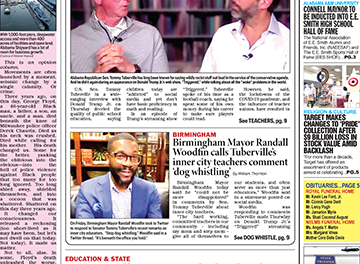By Ryan Michaels
The Birmingham Times
Charlotte Shaw remembers some ominous words when she first came aboard as chief of the Birmingham-Jefferson County Transit Authority.
“I had a few people call and tell me, ‘Hey, you’re going to the CEO cemetery,’” remembered Shaw, who has been president and CEO of BJCTA since October 2021.
Prior to her arrival, the BJCTA—also known as MAX for Metro Area Express—had seen eight different people in the organization’s top executive seat since 2010. Going into her second year as head of the transit agency, Shaw said city and national leaders now see stability at the top of Alabama’s largest transit agency.
“Now, when [we] travel to American Public Transportation Association [events], they know about Birmingham. We’ve changed Birmingham’s image” regarding transit she said.
Shaw, formerly a contracts management professional for companies like SunTrust Bank and Oracle (a technology corporation), got her first transit gig in 2016 with the Metro Atlanta Rapid Transit Authority (MARTA), where she led planning for the system’s projects and managed a long-term budget of $3.5 billion.
She came to Birmingham in January 2020, when she was invited by Mayor Randall Woodfin to join the city’s capital projects office as deputy director. Her task was to oversee the completion of Birmingham Xpress, the city’s new bus rapid transit system, which started operation in September 2022.
Shaw’s experiences in the “trenches” at MARTA and working with the City of Birmingham prepared her for what she has been able to do with the BJCTA, she said.
“I worked the projects, I worked from the levels where I had to do the work, so it’s really easy for me now to manage it or to lead it,” she explained. “I think the city supports me because they believe in what I’m doing and what I’ve accomplished, and those relationships are great.”
Shaw emphasized that building relationships is key: “That’s what I do. That’s what I’m good at. And that’s because, as a project manager, to get a big major project done, you have to be a good relationship builder. That’s important, or you won’t get the project done.”
On the Move
With Shaw in the driver’s seat, MAX is on the move.
On Tuesday, The City of Birmingham and MAX Transit launched a new app that will rebrand the city’s service with Via, a company that provides software that enables cities and transit agencies like Birmingham and BJCTA to deliver low-cost, on-demand public transportation services. The new app — “Birmingham On-Demand – promises to be improved with “fast, easy booking,” according to the city and transit agency.
Just last week, it was announced that the City of Birmingham, in partnership with the BJCTA, will receive an $800,000 federal grant to study citywide transportation issues and help residents gain better access to jobs and other services.
Many Birmingham neighborhoods have been “cut off from one another by highway and rail infrastructure,” said Mayor Woodfin, adding that the federal program seeks to “stitch” those neighborhoods back together.
The funding, Shaw said, is “another significant win for transit in Birmingham,” and the partnership between the authority and the city can serve as a model going forward: “This example of integrated planning with the City of Birmingham demonstrates how we can advance future investments.”
In October, U.S. Rep. Terri Sewell (AL-07) presented a $13.6 million check to the BJCTA, saying transit is an “everyday necessity.”
“There’s nothing more important than being able to get to your job, to get to work, to get to school, to get to your dental appointments,” the congresswoman said. “I believe that public transportation in Birmingham and Jefferson County should be the best it possibly can be.”
Focus on Funding
Going forward, Shaw said she is working with the BJCTA’s government affairs team to plan how to secure more money from political and civic leaders.
The BJCTA has a $55.8 million budget for fiscal year 2023. The authority is supported primarily through federal grants and contracts with individual municipalities in Jefferson County—chief among them, cities like Birmingham, Homewood and Hoover—as well as the county itself.
Ninety percent of the BJCTA’s transit service is located in Birmingham, according to a report from the Institute for Policy Studies and Alabama Arise, and the City allocated $11 million to the authority in its latest budget. Shaw said she has “no complaints” with regard to the city’s relationship with the BJCTA and even cited a recent visit from Mayor Woodfin.
“He met most of my employees, shook hands, talked with them, so I can honestly tell you that that relationship helps us a great deal,” Shaw said. “Even if I think I need more, [the City of Birmingham] is always open to sitting down, listening to me, and authoring a proposal or an amendment to my budget.”
“I hear that’s unusual,” she added.
In fiscal years 2021 and 2022, Jefferson County paid the BJCTA $2,084,902 and $2 million, respectively, mostly from the county’s beer tax. In addition, once a year, the county pays the BJCTA a percentage of its property tax revenue, in addition to some it withholds from Birmingham, which came to $7,897,750 in 2022.
Community Ties
The BJCTA is mindful of the value it provides to the City of Birmingham and the impact it can have on its residents. Last month, MAX unveiled a bus featuring the faces of those who have experienced the loss of a child. The 2023 bus design depicts grieving, heartbroken mothers with their hands extended, each revealing a red-painted palm with a heart in the center—a symbolic gesture urging the public to stop the violence in the name of love.
Shaw said she wanted to make a statement with the bus that might awaken the community.
“Our MAX buses pass through Jefferson County and each of [Birmingham’s] 99 neighborhoods,” she said. “Appealing for nonviolence and love on one of our buses … felt like the perfect gesture.”
Next-Level Transit
Shaw is always on the lookout for ways to better serve BJCTA riders, she said. “Anything on wheels, I really want it, if it’s public facing, because this is where it should be,” she said.
The agency recently acquired two vans for its prospective in-house microtransit service, according to Shaw, who also said a pilot for its ride-booking service could start by the end of 2023.
And, the app launched Tuesday isn’t the first time the city and MAX partnered. The two sides joined forces late last year to expand the hours and coverage area of the microtransit ride-sharing program, which has served more than 140,000 rides to residents, visitors, and workers since its introduction in February 2019. The goal of the program is to expand the reach of public transportation and support the BJCTA’s fixed-route transit lines.
With the new BRT system entering paid service and the inking of the microtransit deal with the city, Shaw said her focus over the next year will be obtaining more funding for the BJCTA and considering the future of the agency’s multiple types of transportation.
“I need more money, man,” Shaw said.
Currently, Birmingham on Demand is simply intended to help cover areas where the BJCTA has seen low ridership, especially given a recent shortage of certified bus drivers, said the CEO.
“What we do is incorporate Via to help us with some of those lower-ridership zones, but it cannot and will not replace fixed routes because we [still] need to increase the number of buses in our higher-ridership areas,” said Shaw.











